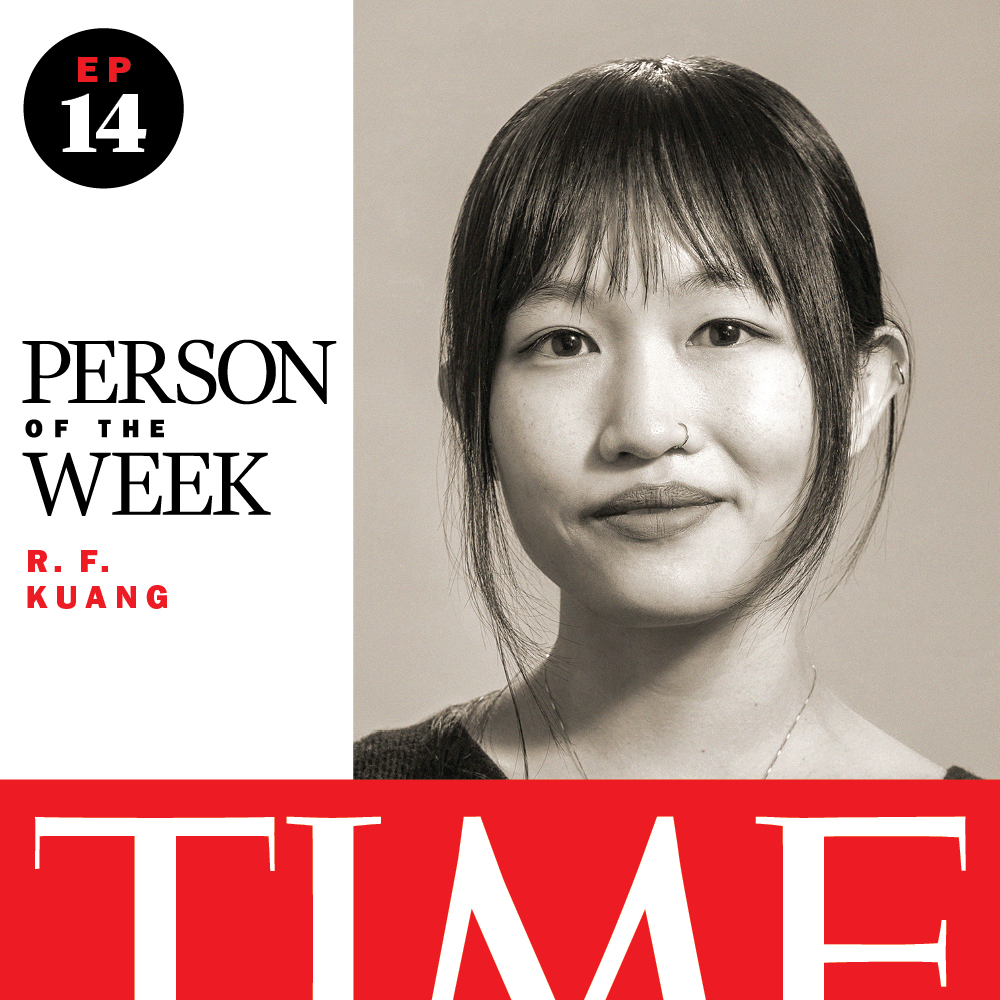Earlier this year, R.F. Kuang published Yellowface, which is one of my absolute favorite novels I’ve read so far this year. It’s a literary thriller that investigates challenging questions about cultural appropriation, racism in publishing, and social media justice.
I could not put the novel down, and ended up reading it in two days. It’s about a struggling novelist who steals her dead friend’s manuscript and passes it off as her own, and the result is an incisive analysis about the racial anxieties of the cultural class.
R.F. Kuang is also the award-winning author of Babel, which was a #1 New York Times bestseller, and the Poppy War trilogy, which she started writing while she was in college. And she’s not just a novelist; she’s also a Marshall Scholar, has degrees in Chinese Studies from both Oxford and Cambridge, and is now getting her Ph.D. at Yale.
More importantly, Kuang is a vital voice in the publishing industry. And, she’s also on the 2023 TIME100 Next—TIME’s annual list that recognizes the rising leaders in health, climate, business, sports, the arts, and more.
Tune in every Thursday, and join us as we continue to explore the minds that shape our world. You can listen to the full episode in the player above, but here are a handful of excerpts from our conversation, which have been condensed and edited for clarity.
On how the publishing industry’s toxic dynamics created her villain:
June is also not acting from an innate desire to hurt and fool others. She’s acting from very true and, I think, universal and relatable emotions. Emotions that almost everybody in the publishing industry has felt at some point. Certainly during the first few years of my career, I felt a lot more like June than Athena….
I think we also need to get better at talking about how writers process their professional jealousy and how they relate to others. We are in this unique moment where there’s this writing ecosystem that largely exists on social media where everyone is advertising their wins all the time. There’s a narrative about what it takes to become a successful writer and what milestones you’re supposed to hit at what points during your career to prove that you are going to be the next big thing. So you need to sign with a hotshot literary agent, you need to sign with a big five publisher, you need to get in a book subscription box or a book club, you need to hit the New York Times bestseller list. There’s a standard script for all of these success markers and when you see these flying in your face, being waved by writers you know, it sucks, and it hurts.
On the myth of diversity in publishing:
There is an odd, persistent myth that diversity is all anybody wants now, and it’s a myth in the vein of ‘immigrants are taking our jobs.’ Essentially the idea that if my manuscript is not doing well, then it’s because I’m not queer or a woman of color or any one of these marginalized subgroups that publishers are only paying attention to these days.
And it’s an especially vicious myth given that it’s not grounded in any empirical evidence. We see surveys of what is being put out by the industry year and year again, and the percentage of novels published by non-white writers has barely budged since the 70s. So there is no rational basis for believing this.
But the reason why I think the myth persists is because rather than making any sustained and serious or comprehensive effort at diversifying what kind of stories are elevated and are described as important, rather there’s this ongoing effort to hold up one or two tokens to prove that, look, we have a very successful Black author, we have a very successful Asian author, here’s our successful gay author. That means that we’ve done our duty, and one or two examples will stand as representation for all the rest.
So I think what’s going on here is both a backlash to any amount of space that opens up for voices who traditionally haven’t had a platform, and also a pernicious tokenism that disguises any real progress.
On who is allowed to write which stories:
I think writers should get to write about whatever they want, and whether they do it well is another question. But inherent to the phrasing, ‘who gets to tell what story’ is: Who’s doing the censoring, who’s granting permission, who is the authority on what’s allowed and what’s not? And I think that takes us into pretty dangerous territory. And it’s also silly territory because the act of writing fiction just is thinking outside of your lived experience and trying to empathize with another.
- How Donald Trump Won
- The Best Inventions of 2024
- Why Sleep Is the Key to Living Longer
- Robert Zemeckis Just Wants to Move You
- How to Break 8 Toxic Communication Habits
- Nicola Coughlan Bet on Herself—And Won
- Why Vinegar Is So Good for You
- Meet TIME's Newest Class of Next Generation Leaders
